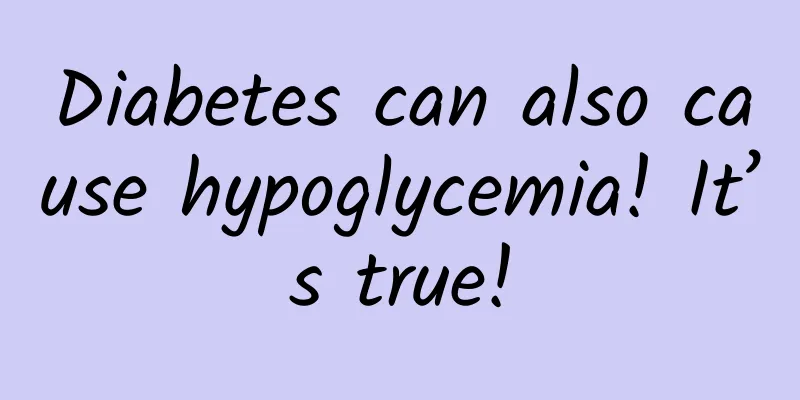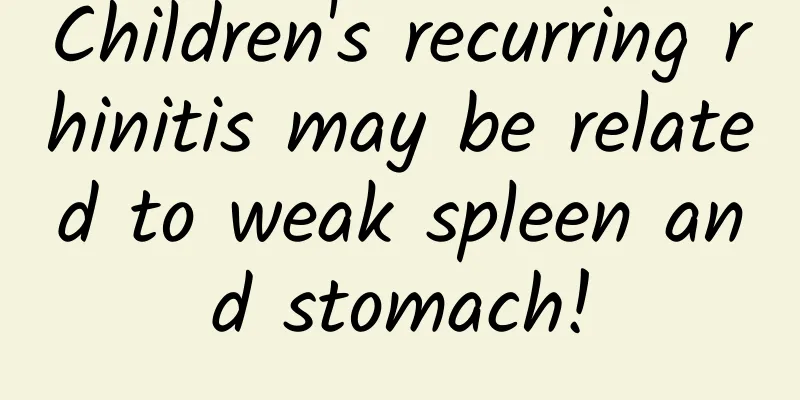Diabetes can also cause hypoglycemia! It’s true!

|
Author: Zhou Yingsheng, Chief Physician, Beijing Anzhen Hospital, Capital Medical University Chairman of the Diabetes Prevention and Control Committee of the Chinese Association of Preventive Medicine Reviewer: Li Guangwei, Chief Physician, Fuwai Hospital, Chinese Academy of Medical Sciences Vice Chairman of the Chinese Medical Association Endocrinology Society Glucose is one of the most important sources of energy for the body. Under normal circumstances, blood sugar concentration is maintained within the physiological concentration range of 3.9-7.8mmol/L to keep the body healthy. Hypoglycemia or hyperglycemia that deviates from the normal range will cause varying degrees of physical discomfort. Normal people will experience hypoglycemia only when they are hungry for a long time, eat little or exercise vigorously. Diabetic patients have high blood sugar, so they will not experience hypoglycemia, right? In fact, this understanding is incomplete. 1. Why do diabetic patients also experience hypoglycemia? Diabetes is a chronic hyperglycemia caused by the body's inability to effectively secrete insulin and/or its utilization defects. The body's blood sugar reduction mainly depends on the body's insulin hypoglycemic regulation. The onset of diabetes is divided into two stages: the pre-onset blood sugar level is higher than the normal range, but has not yet reached the diagnostic criteria for diabetes. It is often manifested as elevated fasting blood sugar or impaired glucose tolerance, which is also a high-risk factor for the onset of diabetes. Diabetes can be diagnosed when elevated blood sugar meets any of the following conditions: (1) Fasting blood sugar measured twice on different days is ≥7 mmol/L; (2) Glycated hemoglobin ≥6.5%; (3) Any blood sugar test or oral glucose tolerance test (OGTT) two-hour blood sugar ≥11.1 mmol/L. The blood sugar level of diabetic patients is generally elevated, but oral hypoglycemic drugs or insulin injections that affect insulin secretion may cause hypoglycemia. Hypoglycemia is more likely to occur when there is no proper diet or the dosage of hypoglycemic drugs is too high. When fasting blood sugar is elevated or glucose tolerance is impaired, the body's insulin secretion is disrupted, which may result in high blood sugar after a meal, but low blood sugar before the next meal, or even hypoglycemia. This phenomenon is more common in obese people. Therefore, both people with diabetes and those with elevated blood sugar levels before developing diabetes are at risk of hypoglycemia. Figure 1 Original copyright image, no permission to reprint 2. Who needs to be alert to hypoglycemia? In addition to diabetic patients and people with elevated blood sugar before developing diabetes, there are some people who also need to be alert to hypoglycemia. First, pregnant women with high blood sugar levels often present with hypoglycemia before meals. Therefore, diabetes screening should be done before and during pregnancy to effectively prevent the occurrence of diabetes and hypoglycemia. Second, patients with coronary heart disease and diabetes. Hypoglycemia in patients with coronary heart disease can induce acute myocardial ischemia, leading to angina pectoris, myocardial infarction, and even sudden death, which is extremely harmful to health. Third, patients with cerebrovascular disease and diabetes. Hypoglycemia can cause abnormal emotions such as irritability and slow reaction, which requires high attention. Fourth, elderly patients with diabetes. Because the body functions of the elderly decline to varying degrees and their body sensitivity decreases, they should actively prevent and avoid the harm of hypoglycemia. Fifth, thin people. The amount of glucose stored in the body is relatively small, and thin people are more likely to suffer from hypoglycemia if they do not eat on time. Sixth, kidney disease patients. Compared with healthy people, kidney disease patients are more likely to suffer from hypoglycemia. 3. How low is the blood sugar level to be considered hypoglycemia? Medically, hypoglycemia can be diagnosed when the blood sugar level of a diabetic patient is lower than 3.9mmol/L. Hypoglycemia can be diagnosed when the blood sugar level of a non-diabetic patient is lower than 2.8mmol/L. Therefore, the criteria for judging hypoglycemia vary among different populations. Fasting blood sugar and 2-hour postprandial blood sugar are important monitoring indicators commonly used in clinical practice to reflect blood sugar status. The blood sugar level from fasting for more than 8-10 hours from the evening of the same day to the next morning is the fasting blood sugar level. It reflects the basic blood sugar level from night to morning, and the normal range is 3.9-6.1mmol/L. 2-hour postprandial blood sugar refers to the blood sugar level two hours after the start of eating, reflecting the degree of blood sugar increase after eating, and the normal blood sugar level should be less than 7.8mmol/L. 4. What are the dangers of hypoglycemia? Mild hypoglycemia can cause typical symptoms such as hunger, palpitations, hand tremors, sweating, etc. In severe cases, it can lead to abnormal emotions such as anxiety and irritability, and even coma and life-threatening conditions. Figure 2 Original copyright image, no permission to reprint Symptoms of hypoglycemia vary from person to person. Some people are affected by psychological factors such as fear and anxiety, and their hypoglycemia may not be severe, but they may feel obvious physical discomfort. Symptoms of hypoglycemia are important danger warning signals. Hypoglycemia without typical symptoms is not easy to identify and is more harmful to health. For example, rebound hyperglycemia caused by hypoglycemia will make blood sugar control more difficult. Diabetic patients are prone to cardiovascular and cerebrovascular diseases and should maintain a regular lifestyle, such as eating on time. They should strictly follow the doctor's advice to use hypoglycemic drugs to effectively avoid hypoglycemia. It is recommended that diabetic patients carry some sugar cubes or sugary drinks with them so that they can replenish sugar in time when they realize that hypoglycemia has occurred to avoid harm to their health. |
<<: 【Life Science】Winter Sports Precautions and Sports
>>: How to eat during morning sickness? !
Recommend
Normal blood pressure for a 50-year-old woman
The normal blood pressure for a 50-year-old woman...
Unmarried women's gynecological diseases
Gynecological diseases are a type of female disea...
How to read pregnancy blood test report
During pregnancy, you will undergo many prenatal ...
How do I view the relationship between colleagues? What should I do if I have sex with my colleague today and go home?
There are many colleagues who have feelings for e...
What should I do if my breasts become swollen while breastfeeding?
Breast pain during lactation is mostly caused by ...
Causes of stomach bloating in pregnant women
Many pregnant women usually feel a kind of bloati...
What tea is the fastest way to lose weight on your legs? These four are preferred
Many women want to have slender and white legs, s...
At what age does a woman stop ovulating?
When a woman's ovaries do not ovulate, they w...
What to do if the rectus abdominis separates after childbirth
Many mothers feel that their belly seems to have ...
Want to eat bread but afraid of getting fat? Eat these breads.
In the eyes of many people, bread is our natural ...
Can I get a whitening injection during menstruation?
During menstruation, a woman's uterus is very...
I’ve been feeling hungry lately. Am I pregnant?
For women who have never given birth, many of the...
What color of latex paint is durable and timeless? How many colors can latex paint generally be painted?
In daily life, many people use latex paint when d...
Will you feel cold during early pregnancy?
It is a common condition in life for pregnant wom...









